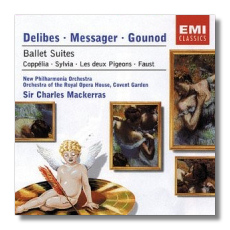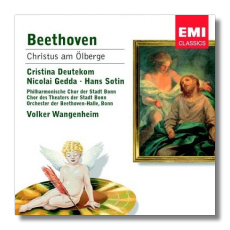
The Internet's Premier Classical Music Source
Related Links
- Latest Reviews
- More Reviews
-
By Composer
-
Collections
DVD & Blu-ray
Books
Concert Reviews
Articles/Interviews
Software
Audio
Search Amazon
Recommended Links
Site News
 CD Review
CD Review
EMI Encore

- Léo Delibes: Highlights from Coppélia and Sylvia
- André Messager: Highlights from Les deux Pigeons *
- Charles Gounod: Faust - Ballet music
New Philharmonia Orchestra/Charles Mackerras
* Orchestra of the Royal Opera House, Covent Garden/Charles Mackerras
EMI 7243 5 75221 2 ADD 67:58


Ludwig van Beethoven
- Christus am Ölberge, Op. 85 (Christ on the Mount of Olives)
Cristina Deutekom (Seraph)
Nicolai Gedda (Jesus)
Hans Sotin (Peter)
Beethovenhalle Orchestra, Bonn/Volker Wangenheim
Philharmonic Choir and Theater Choir of the City of Bonn
EMI 7243 5 85687 2 ADD 55:20
Budget-priced Encore releases aren't much for booklet notes, but one thing I learned from the first CD listed here is that Sir Charles Mackerras actually was born in the United States (to Australian parents)! Over the course of his long career (he made his London debut in 1948), he has carved several niches for himself, including ballet music, and later, the music of Janáček. It is of course ballet music of the French variety which is the first CD's raison d'etre.
The Messager was recorded way back in 1956, although the sound has held up nicely. The rest of the program was recorded in 1968 and 1969. Messager's ballet can be summed up as follows: boy, looking for excitement, runs off with gypsies. The gypsies beat him up and boy returns to girl, sadder but wiser. Less than half of the score is included here, but none of the better bits are missing. This is a good introduction to the score for those who are curious but who don't want to make a commitment just yet. Mackerras can't hide the fact that the music is a bit domesticated, just like the "two pigeons" of the title.
We are given only three excerpts from Coppélia and four from Sylvia, so this disc is not a good choice for those who are interested primarily in these works. Mackerras cracks the whip, particularly in Coppélia. I don't know a version that is more accented than this one, and that characteristic makes these readings less idiomatically French than others. As for the music from Faust, Mackerras has a good time with it. And really, why not? Can you think of a better example of fun yet trashy music?
I confess to having been completely unfamiliar with Beethoven's Christ on the Mount of Olives until I received the second CD for review. This work was premièred in 1803 and revised a year later, so it is a work of the composer's early maturity. Rather than treating the Passion of Christ with reverence, solemnity, and tenderness, Beethoven places us right in the middle of the drama, imbuing even Jesus and the Seraph with human characteristics; this is an almost operatic interpretation of Christ's last hours. Granted it is not Beethoven's very best work, and as is often the case with this composer, the vocal writing is hardly singer-friendly. (The soprano singing the Seraph almost has to stand on her head to get through the most complicated passages.) Nevertheless, I found myself repeatedly wondering why I had not heard this music before, because even middling Beethoven can be pretty damn good! As Christ on the Mount of Olives moves along, its drama sweeps at least this listener right along with it.
This recording was made in 1970, the Beethoven bicentennial, in Bonn – the city of the composer's birth. Conductor Wangenheim is a complete unknown to me, but he runs a tight ship and seems to be in sympathy with the music. The choruses are enthusiastic rather than highly refined. The three star soloists are who really make this recording shine. Deutekom, a soprano with one of the most distinctive voices around, wraps her diamond-bright instrument around Beethoven's difficult lines with ease, and she indulges us with large helpings of her adorably clockwork coloratura. (It's like listening to a wind-up canary.) Gedda is no less ardent and sympathetic as Jesus than he is as Werther or Rodolfo. Playing God is never easy, and Gedda embodies the divine… well, divinely. The soloists are anchored by Hans Sotin's strong and sensitive Peter. The trio near the end of the work brings Beethoven's concept together thrillingly.
The engineering is excellent. I do wish texts and translations had been included, however, given the unfamiliarity of the work. Apart from that, this CD is a steal, and enthusiastically recommended, especially to those who do not know this music.
Copyright © 2004, Raymond Tuttle


















